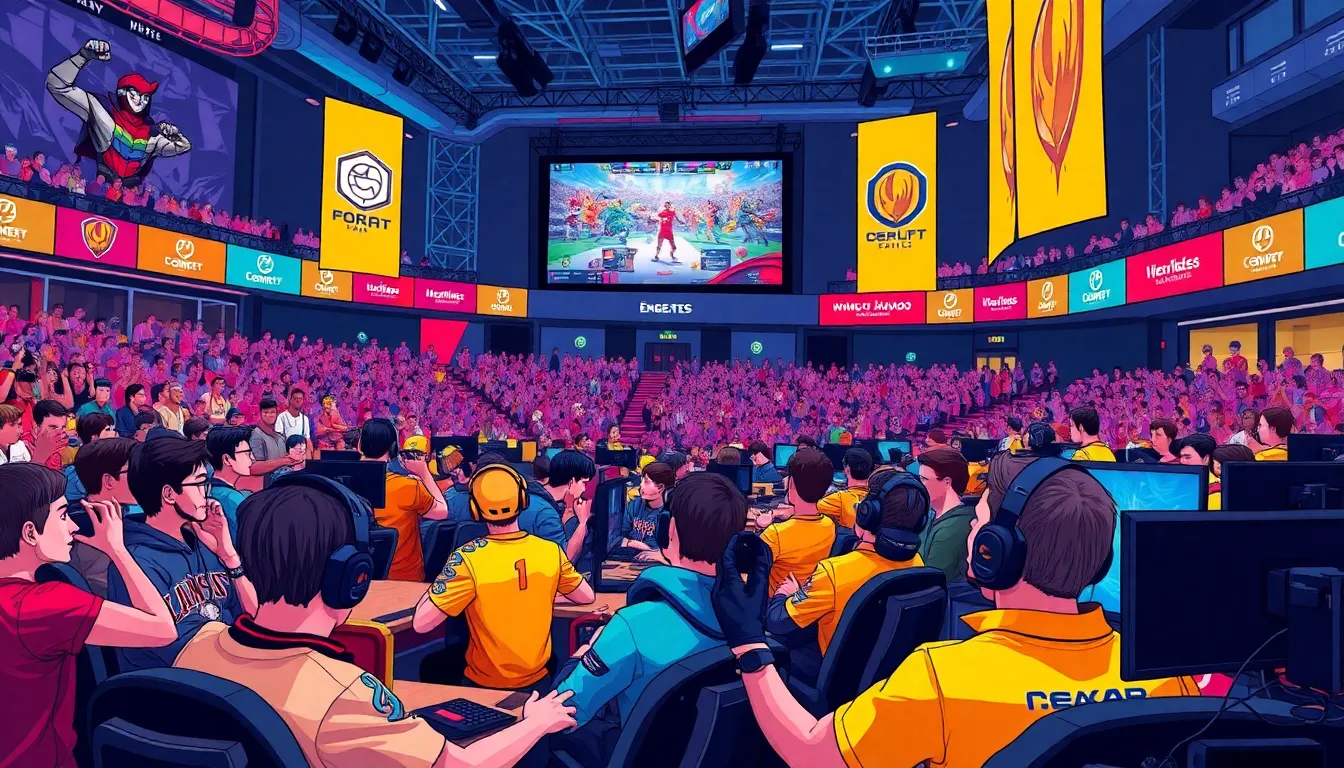Table of Contents
ToggleIn a world where gaming meets strategy and competition, fantasy esports has emerged as the ultimate playground for fans and players alike. Imagine assembling your dream team of esports athletes, all while flexing your analytical skills like a pro. It’s like being a sports manager but without the stress of dealing with million-dollar contracts or temperamental players.
With the rise of competitive gaming, fantasy esports offers a thrilling twist that keeps fans glued to their screens. It’s not just about watching; it’s about participating, strategizing, and maybe even winning some bragging rights—or a cash prize if luck’s on your side. So grab your virtual clipboard and get ready to dive into the exhilarating world of fantasy esports, where every match could make or break your fantasy team, and every point counts.
Overview Of Fantasy Esports
Fantasy esports allows fans to engage deeply with their favorite games. Participants select real esports athletes to form personalized teams based on performance metrics. They analyze player statistics, match history, and team dynamics to maximize their teams’ potential.
Each fantasy league operates with unique rules, often focusing on specific games like League of Legends or Dota 2. Scoring systems typically reward individual player achievements such as kills, assists, or match wins. Players earn points based on these achievements during live tournaments, directly impacting their fantasy standings.
Engagement comes not just from competition but from the strategic elements involved. Creating a winning team requires research, foresight, and a solid understanding of the esports landscape. Participants often track player performance trends, injury updates, and team rosters to make informed decisions.
Communities form around fantasy esports, fostering collaboration and competition among fans. Online platforms facilitate discussions and strategies, enhancing the overall experience. Success in fantasy esports often leads to cash prizes or recognition within these communities.
Overall, fantasy esports blends gaming with strategic planning, appealing to both casual viewers and dedicated fans. It transforms the viewing experience, as every match holds the potential to affect fantasy team outcomes.
Popular Genres In Fantasy Esports

Fantasy esports encompasses several popular genres, each attracting dedicated communities. Notable genres include Multiplayer Online Battle Arena (MOBA) and First-Person Shooter (FPS), which provide engaging gameplay experiences.
Multiplayer Online Battle Arena (MOBA)
MOBA games like League of Legends and Dota 2 dominate the fantasy esports landscape. Participants select real players, forming teams that compete based on individual performance metrics. Metrics include kills, deaths, assists, and objectives completed. Players analyze match statistics and trends to make informed roster decisions. Unique scoring systems reward strategic gameplay, enhancing fan engagement. Tournaments frequently showcase these games, amplifying interest. As fans watch competitive matches unfold, they experience heightened excitement when their fantasy team performs well in real-time.
First-Person Shooter (FPS)
FPS titles such as Counter-Strike: Global Offensive and Call of Duty offer another thrilling fantasy esports genre. Fantasy leagues revolve around player statistics, enabling fans to draft top performers. Metrics often include headshots, kills, and win rates. Fans maintain an in-depth understanding of team dynamics and player roles to maximize their fantasy potential. Community discussions center around strategies and player performances. Major events, like championships, draw significant viewership, impacting fantasy outcomes dramatically. The blend of fast-paced action and strategic depth keeps participants engaged, as every match influences their fantasy scoring.
Platforms For Fantasy Esports
Participants can enjoy fantasy esports through various platforms that enhance the gaming experience.
Mobile Apps
Mobile apps provide a convenient way to engage with fantasy esports. Popular applications allow users to draft teams, follow player stats, and make real-time adjustments during matches. Apps like the ESL and FanDuel cater specifically to fantasy esports. These platforms facilitate quick updates with notifications for key player performances and match events. Users can compete in leagues and tournaments directly from their mobile devices. Convenience plays a key role, as fans stay connected to their fantasy teams anytime and anywhere.
Websites
Websites serve as robust platforms for fantasy esports. Leading sites such as Esports Fantasy and DraftKings offer comprehensive tools for team management and player analysis. Users can access in-depth statistics, live scoring, and expert insights all in one place. Many websites feature user-friendly interfaces designed for seamless navigation. Engaging communities exist through discussion forums and chat features, allowing fans to exchange strategies and tips. Websites often host special events and contests, further enhancing the competitive atmosphere of fantasy esports leagues.
Key Strategies For Success
Success in fantasy esports relies on strategic planning and a comprehensive understanding of player performance and team composition. These aspects become crucial for maximizing points and overall success in competitions.
Understanding Player Performance
Analyzing player performance is foundational for constructing a strong fantasy team. Focus on key metrics such as kills, deaths, assists, and match history to evaluate athletes effectively. Reliable stats from reputable sources serve as essential tools for making informed decisions. Monitoring player form during ongoing tournaments can reveal trends that impact fantasy outcomes.
Consistency matters as well. High-performing players with proven track records usually yield better results. Consider the individual roles within a game, as some players may thrive in specific conditions. Overall, thorough research enhances the probability of selecting top performers.
Team Composition Tips
Building the right team composition significantly influences fantasy success. Diversification in player selection introduces balance. Combining aggressive and supportive roles can enhance scoring opportunities while reducing risk.
Prioritize synergy between selected players by examining their real-life collaborations. Favoring players from winning teams often leads to more favorable match outcomes. Additionally, staying updated with roster changes ensures participants adapt quickly to emerging trends.
Strategize lineup adjustments based on upcoming matchups. Awareness of the opposing team’s strengths and weaknesses can guide choices. Timely changes often lead to maximizing points in competitive leagues.
Upcoming Trends In Fantasy Esports
Fantasy esports is evolving rapidly, showcasing innovative features and enhanced engagement. Virtual reality integrations are emerging, offering immersive experiences for participants. Data analytics advancements improve player evaluations, allowing for more informed decisions when forming teams.
Mobile app development continues to gain traction, enabling on-the-go management of fantasy teams. Real-time updates and notifications about player performances keep users engaged during live matches. Social media platforms increasingly cater to fantasy esports discussions, fostering community connections among fans.
New scoring formats are being tested, encouraging competitive diversity. Innovative leagues may introduce features like dynamic scoring that shifts based on current match events, increasing excitement and strategy. Collaborations between fantasy platforms and traditional sportsbooks are also on the rise, creating hybrid betting opportunities for participants.
Niche esports titles are gaining recognition, expanding the offerings within fantasy esports. Emerging games like VALORANT and Apex Legends attract new fans, leading to greater variety in team selections. Communities around these titles provide unique opportunities for strategy sharing and collaboration.
Educational resources are being developed to help newcomers understand fantasy esports. Tutorials and guides simplify complexities, making the experience more accessible to a wider audience. Incentives like bonuses for new users encourage participation and engagement.
Technological enhancements are driving growth in fantasy esports, shaping its future direction. Data-driven strategies and increased accessibility position fantasy esports to thrive as a prominent aspect of the gaming landscape. Player interaction and community involvement remain crucial as trends evolve.
Fantasy esports represents a thrilling intersection of strategy and community engagement. As fans immerse themselves in the world of competitive gaming, they not only enjoy the matches but also become integral players in the narrative. The strategic depth involved in team selection and performance analysis keeps participants invested and continuously learning.
With the rise of innovative platforms and evolving trends, the future of fantasy esports looks bright. Enhanced engagement through mobile apps and community discussions fosters a vibrant atmosphere where fans can connect and compete. As the landscape continues to grow, the excitement surrounding fantasy esports will undoubtedly capture the attention of even more enthusiasts.




